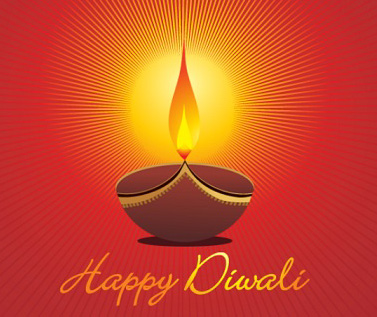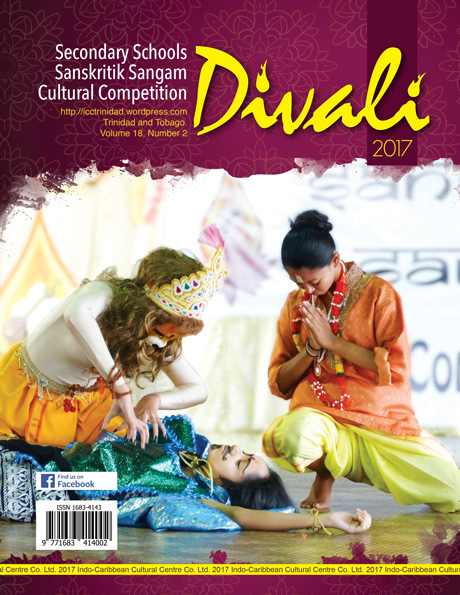| October 18, 2017 issue | |
Community Connection |
|
| Sangam Cultural Competition theme of 2017 ICC Diwali magazine of T&T | |
|
|
| 2017 Diwali magazine cover of the Indo-Caribbean Cultural Centre | |
By Dr. Kumar Mahabir |
|
| Celebrating Diwali in the 1940s in a village in Guyana | |
 |
|
By By Vidur Dindayal Diwali celebrations at my old village of Rosignol (Guyana) was simply magical. It is not surprising that I remember only the bright lights of Diwali then in the 40s when there was no electricity, no street lights and most of the village was pitch dark after sundown. Diwali lights made those nights more exciting than any other. We children looked forward to Diwali because of the freedom to play and the bonus of nice things to eat. Of course we had to get our homework and housework out of the way and our parents helped us to get our priorities in order so that we would be free in the late afternoon and early evening to enjoy ourselves. Around four-ish, we would go and bathe. It was more fun to do so in the backyard. There again we would have laughter and pranks, in between drenching ourselves with water from a bucket, soaping and washing out the soapiness. When we had enough of fun and at the call from our parents to finish, the exciting act of bathing was to lift the bucket with its remaining water over our heads for a last moment of blissful drenching. Dried out and with clean clothes we children were ready for Diwali. Diwail lights were Diyas - little lamps. Maa made these - tiny bowls of dough, filled with ghee and a cotton wick. We helped our parents, carefully placing the diyas in every room, doorway, table, step, porch and pathway outside. The problem with diyas outside was they go out easily with any strong breeze. Our job was to keep an eye on them. We could spend hours just looking at the little diya flames doing their dance, swaying, whirling, and taking a bow now and then. You don't get this with an electric light bulb. Years later our parents installed an electric lighting plant, but at Diwali night, they would make it a special occasion to switch off the electric lights, to let the living lights of the diyas bless the home with their heavenly glow. I learnt about Diwali from our late father Pandit Petamber Dindayal. He believed in living a life of warmth and love, of service and seeking knowledge. Diwali, is a time for special prayers. Goddess Lakshmi, is specially worshipped at Diwali. Divine Mother Lakshmi, born out of the ocean of milk, is the Goddess of beauty, light, knowledge, purity, wealth and good fortune. Mother Lakshmi is celebrated in our mother, aunt, sister, wife, daughter and niece. Maa Lakshmi comes out of a lotus flower, holds lotus flowers in her hands, the lotus flowers representing purity. Her other hands are giving. As Goddess of wealth Maa Lakshmi shares her wealth. Prayers to Maa Lakshmi (Lakshmi Pooja) give thanks for her blessings in the past year and for continued prosperity in the new year. Diwali lights attract Maa Lakshmi, who will dwell in the home that is brightly lit, clean and tidy, in the new year. Goddess Saraswati and Lord Ganesh, in the company of Maa Lakshmi are also worshipped at Diwali. We pray to Saraswati, goddess of learning, music and the arts. We pray to Lord Ganesh, the all powerful elephant headed God of wisdom and good fortune, the remover of obstacles, for his blessings for success to attend all our undertakings. Diwali or Dipaawali (Cluster of Lights) is the climax of the autumn Hindu festival season of worship and celebration of our heavenly Mother. It starts with Navratri (nine nights) worship of Mother Durga - Durga Maa. Navratri celebrates Durga Maa's nine powers, represented in nine forms. Colour, the Lord's gift of visual splendour is vital in the celebrations. There is a different dress colour for each day/and night of Navratri. On the first day/night Durga as Shailaputri Maa, the daughter (putri) of the Himalaya mountains (shaila) is worshipped. The dress colour is bright red. Second: Bharmacharini - devout austerity, dress colour - royal blue. Third: Chandraghanta -possessor of great strength, colour - yellow. Fourth: Kushmanda - creator of the universe, colour - green. Fifth: Skanda Mata - vanquisher of demons, colour - grey. Sixth: Katyayani - sage Kata's daughter, colour - orange. Seventh: Saptami - protector of devotees, colour - white. Eighth, Maha Gauri - epitomy of purity, colour - pink. Ninth: Siddhidatri - supernatural healer, colour - sky blue. Dusshera festival follows at the end of Navratri on the tenth day and night. Dusshera celebrates the victory of Lord Rama over the demon Ravana. Twenty days after Dusshera, we celebrate Diwali. Diwali celebrates many other great events for Hindus: the marriage of Divine Mother Lakshmi to Lord Vishnu; the death of wicked king Naraksura at the hands of Lord Krishna; Lord Vishnu's humbling of arrogant Balli; the day Great King Vikram Aditya ascended his throne; the visit of generous King Mahaballi; the return of Princess Deepa, and prosperity to her kingdom. Goddess Kali is worshipped at Diwali, to banish all evil from the world. Diwali celebrates the end of Lord Rama's 14 years in exile, and his triumphant return as king. Millions of lights showed the way to Holy City Ayodhya, itself aglow with lights on Diwali night. On Diwali night, Pitrus, departed souls, flickering as lights, ascend to the heavens. The prime significance of Diwali is universally celebrated: the Triumph of Good over Evil, Right over Wrong, Light over Darkness. The lights of Diwali symbolise Knowledge, the Dark night, Ignorance. We owe a debt of gratitude to our parents and ancestors for blessing us with that Light of Knowledge - the pathway to making our way in the world, to live and prosper with dignity. Diwali lights are our prayer, as in this Sanskrit verse in the Upanishad in Hindu scripture: 'Om Asato Maa Sad-Gamaya; Tamaso Maa Jyotir-Gamaya; Mrtyor-Maa Amrtam Gamaya.' 'Lead us O Lord from Falsehood to Truth, from the Darkness of Ignorance into the Light of Knowledge and from the Fear of Death to Knowledge of the Immortal Self'' |
|
| Toronto Arya Samaj Diwali | |
Toronto Arya Samaj invites you to its Diwali Prayer Service on Wednesday, October 18, 2017 from 6:30pm at the Arya Samaj Mandir, 4345-14th Ave, Markham. There will be prayers, lighting of Diyas, kirtan and bhojan. The Annual Diwali Concert will be held on Saturday, October 21, 2017 at 6:30pm featuring the historical play, Hesperus, in commemoration of the 100th anniversary of the abolition of indentureship. Tickets $20 per person. Kids under 12 - $10. For info call Pt Dave Ramoutar 416-663-4037, Pandita Jasodra Prasad 416-287-0330, Adit 647-866-1926. |
|
| Local Ladies Cricket Club gears up to help Dominica |
|
Kaisoca Ladies cricket club of Toronto through its founder and manager, George Maharaj, has organised a food and clothing drive in aid of the ravaged Caribbean island of Dominica. Permission was given by the Dominican Association of Ontario. Date : Sunday October 29th. 2017 Time : 12 noon to 5pm. Drop off venue : 2020 Don Mills Road, Toronto. Items urgently needed are : canned food, baby cereals, hammers and saws, tooth brushes, toothpaste, soaps, blankets, clothing. Kaisoca Ladies cricket club currently has in its roster three Dominican players as well as players from Trinidad and Tobago, Guyana, St. Vincent, Barbados, Pakistan, India and Australia. Kaisoca Ladies has captured the league’s championship in 2011 and 2016 and was runner up this year. Contact : George Maharaj 905-621-6157 |
|
| Soulful Messiah | |
Bring in the holidays with Ballet Creole’s signature holiday production. Using the universal languages of spirituality and joy, Soulful Messiah combines tap, African-Caribbean, ballet, jazz and Modern dance styles, creating a unique holiday classic, soulfully danced to Quincy Jones’ Grammy Award-winning rendition of Handel’s Messiah. Friday, Dec 1, 2017 @ 8pm; Saturday, Dec 2, 2017 @ 8pm; Sunday, Dec 3, 2017 @ 3pm at Fleck Dance Theatre, Harbourfront, Centre, 207 Queens Quay West, Toronto. Cost: $20-48. Contact: info@balletcreole.org; http://www.balletcreole.org/ |
|
| Hindu Heritage Month | |
Vishnu Mandir observes Hindu Heritage Month on November 4 from 11am at 8640 Yonge St, Richmond Hill. Program includes music and dances from India and the diaspora, wellness and Yoga sessions, talks on Vedic teachings, and free tour of the Canadian Museum of Indian Civilization. Free meals at end of program. Call: 905-886-1724. |
|
| Career, Education and Settlement Immigrant Fair in GTA for Dec 8 | |
Canadian Immigrant magazine has announced a Career, Education and Settlement Immigrant Fair in the Greater Toronto Area for 2017 at the Living Arts Centre on Friday, December 8, 2017, 10 a.m. to 4 p.m. The fair is for immigrants who are looking for information relating to jobs, school and settlement in their new home. Admission id free. |
|
| Heritage Centre Diwali | |
Durban Hindu Heritage Centre will hold its 1st Diwali Gala on Friday Oct 13 at 7pm at Chandni Grand Banquet Hall, 3895 McNicoll Ave, Scarborough. Tickets $50 includes dinner. For info, callKamal Soni 905-767-0072, Pt Damodar Sharma 416-577-1641 or Mohan Bissoondial 647-769-5961. |
|
| Career, Education and Settlement Immigrant Fair in GTA for Dec 8 | |
Canadian Immigrant magazine has announced a Career, Education and Settlement Immigrant Fair in the Greater Toronto Area for 2017 at the Living Arts Centre on Friday, December 8, 2017, 10 a.m. to 4 p.m. The fair is for immigrants who are looking for information relating to jobs, school and settlement in their new home. Admission id free. This Mississauga venue fair will include: • diverse exhibitors, including employers, education institutes and social service agencies • interactive activities like a resumé clinic and networking opportunities • inspirational speakers’ lineup • and more to be announced later |
|
 |
|
 |
|
| < In The News | |
